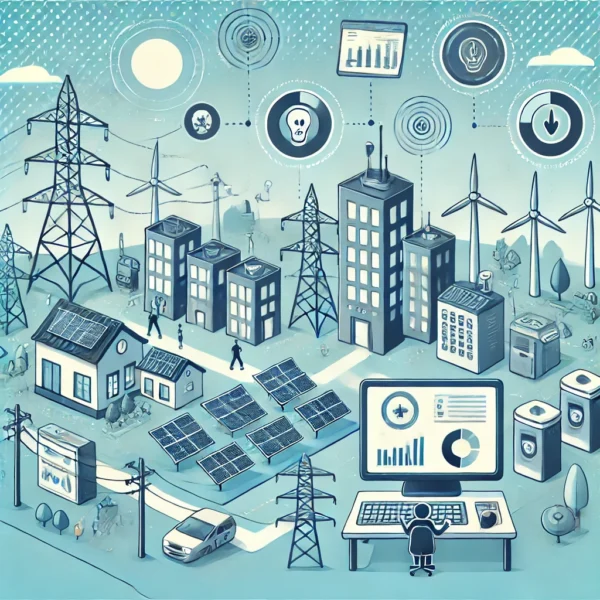Introduction:
Smart grids represent the next generation of energy infrastructure, bringing a transformative approach to managing electricity. These advanced systems leverage real-time data, advanced communication, and intelligent management tools to significantly improve load management and minimize blackouts. This article explores the capabilities of smart grids in enhancing efficiency and reducing power outages.
part one :What is a Smart Grid?
A smart grid is a modern system that integrates information and communication technologies into the electricity network. It enables bidirectional flow of energy and information between producers and consumers, utilizing sensors, automation tools, and data analytics to optimize energy distribution and manage demand.
part two :Smart Grid Capabilities in Load Management
- Real-Time Monitoring and Analysis of Energy Usage:
Smart grids provide the ability to monitor energy consumption in real-time, allowing operators to identify peak demand points and take immediate actions to balance the load. - Optimized Load Distribution:
Advanced algorithms in smart grids automatically distribute load across different regions to prevent overloads or energy shortages. - Demand Response Management:
One of the critical features of smart grids is demand response. The system sends signals to consumers, encouraging them to reduce energy usage during peak hours. - Integration of Renewable Energy Sources:
Smart grids efficiently integrate variable renewable energy sources (like wind and solar) into distribution networks, reducing dependency on fossil fuels. - Utilization of Energy Storage Systems:
By connecting energy storage systems (like batteries) to the grid, excess energy produced during low-demand periods can be stored and used during peak demand.
part three :Smart Grid Capabilities in Reducing Blackouts
- Automatic Fault Detection:
Smart grids use sensors and monitoring systems to quickly identify and locate faults and outages in the network. - Automated Grid Reconfiguration:
In case of a fault or outage, smart grids can automatically reroute power flow and isolate affected areas, preventing widespread blackouts. - Predictive Maintenance:
By analyzing real-time data and leveraging artificial intelligence, smart grids can predict potential issues before they occur and take preventive measures. - Improved Grid Stability:
Smart grids enhance grid stability by precisely controlling energy generation and consumption, reducing the likelihood of blackouts caused by network imbalances. - Faster Recovery After Outages:
In the event of a blackout, smart grids use detailed data and automated tools to accelerate the restoration process.
part four :Economic and Environmental Benefits of Smart Grids
- Cost Reduction:
Reduced blackouts and improved energy management lower repair costs, excess energy expenses, and economic losses. - Reduced Greenhouse Gas Emissions:
By optimizing energy consumption and integrating renewable energy sources, smart grids help reduce environmental pollution. - Enhanced Consumer Satisfaction:
Lower outages and transparent information on energy usage improve customer satisfaction and trust.
part five :Challenges in Implementing Smart Grids
- High Initial Costs:
Installing new infrastructure, such as smart meters and sensors, requires substantial investment. - Security and Privacy Concerns:
Data collected in smart grids may be vulnerable to cyberattacks or privacy breaches. - Need for Consumer Education and Behavioral Change:
The success of smart grids depends on consumer awareness and cooperation in managing energy usage. - Insufficient Infrastructure in Some Areas:
In underdeveloped regions, the lack of adequate infrastructure can pose a significant barrier to implementing smart grids.
Conclusion
Smart grids, with their advanced capabilities in load management and reducing blackouts, offer an effective solution to the growing challenges of energy supply. While implementing these systems comes with challenges, their economic, environmental, and social benefits are substantial. Investing in the development of smart grids can be a significant step toward enhancing the sustainability and efficiency of the energy sector.




